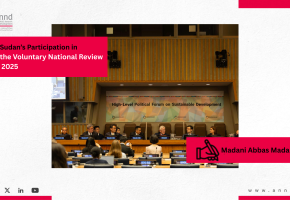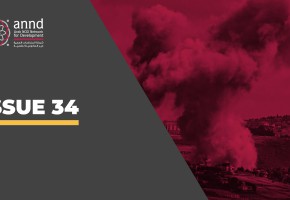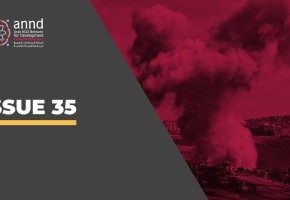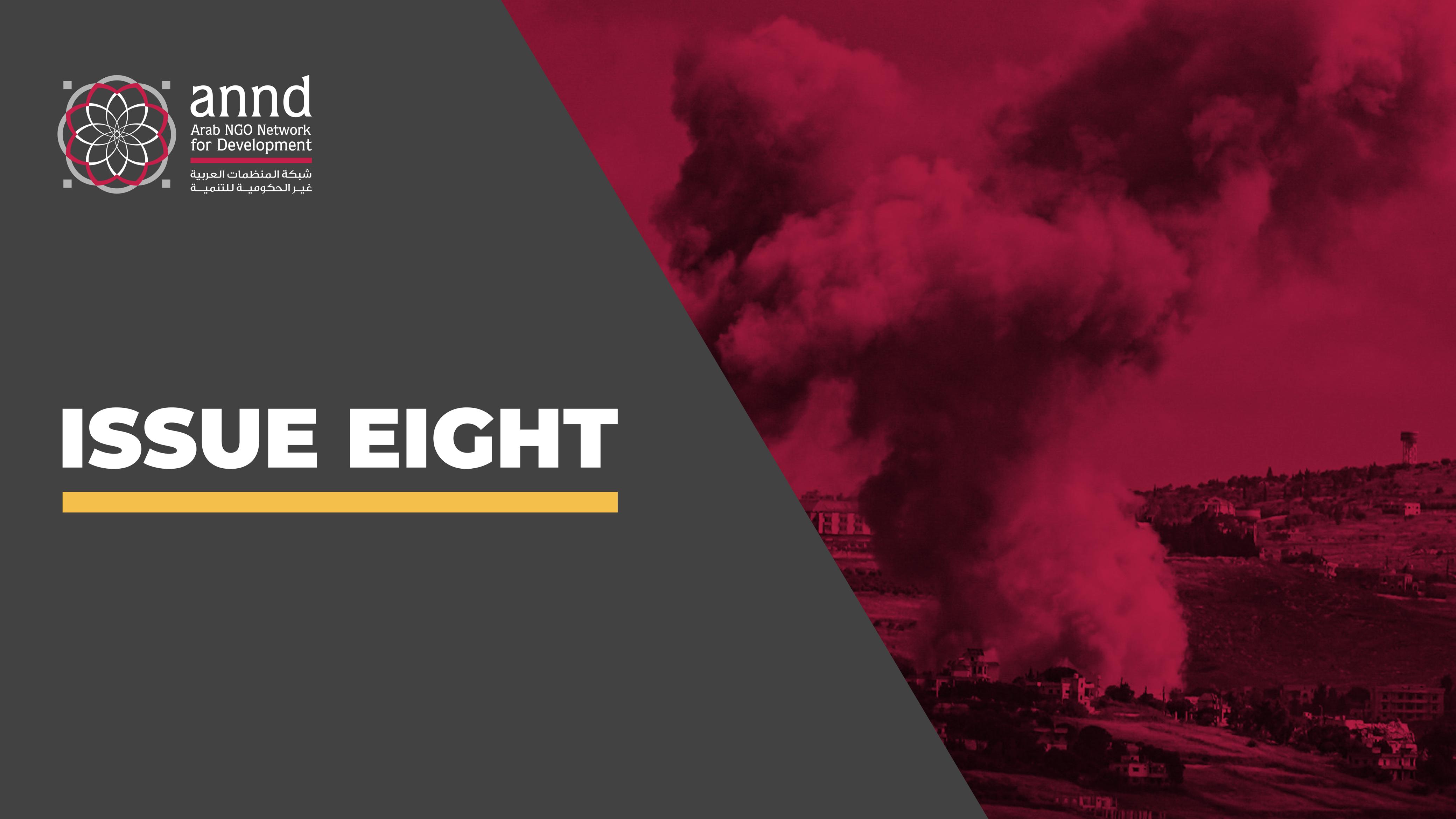
A Region on Fire
Issue Eight - October 4, 2024
Military operations expansion in the region
Border crossings blocked, medical crews targeted in Lebanon, and concerning developments in the West Bank.
The war launched by Israel against Lebanon, Gaza, and the West Bank continues. In a significant development, an airstrike on Friday targeted the main border crossing between Lebanon and Syria, worsening the humanitarian crisis. The strike hit part of the road near the Masnaa border crossing, located 700 meters from the Lebanese checkpoint and about five kilometers from the Syrian border. This has blocked access to the vital crossing, especially for those fleeing Indiscriminate bombing and for the delivery of humanitarian aid.
On Friday, the Ministry of Health in Gaza announced the martyrdom of 41,802 people since the beginning of the war about a year ago.
In its daily statistical report, the ministry said the Israeli army "committed three massacres against families in the strip, with 14 martyrs and 50 injuries reaching hospitals" within the last 24 hours.
The West Bank also endured Israeli escalation in Tulkarm (on Friday) following an airstrike, the first of its kind in the city since the Second Intifada, which started in 2000. This marked a dangerous shift in the nature, scale, and frequency of attacks in the West Bank. Israel has escalated its attacks in the West Bank since the war began in Gaza on October 7, killing more than 720 Palestinians in various attacks characterized by the reuse of aircraft in assassinations and wide-scale operations. Israel has also allocated significant resources to the West Bank, deploying three reserve battalions a few days ago for "operational and defensive" purposes and "military missions."
Battlefield Developments
Israeli air forces launched the most violent airstrike on the southern suburb of Beirut, similar to the one carried out on September 27, which led to the assassination of Hezbollah's Secretary General Hassan Nasrallah. Israel claimed it targeted a meeting of Hezbollah's new leadership, including Hashem Safieddine, a candidate to succeed Nasrallah.
While Israeli officials has not confirmed the results of the airstrike, it is notable that they prevented ambulance and civil defense crews from reaching after Israel threatened to bomb relief and medical teams.
On Friday, the Israeli army issued new warnings to the residents of twenty new towns and villages in southern Lebanon, urging them to evacuate immediately. There is growing concern within Lebanon that Israel may be preparing to reoccupy parts of southern Lebanon.
The Lebanese Ministry of Health announced that six hospitals in various regions of the south and western Bekaa were out of service due to either being targeted or the increasing siege on the frontline villages in the south. Roads and supply lines have been cut off, making it difficult for medical, nursing, and administrative staff to reach them, and there is a shortage of electricity, diesel, medicine, medical supplies, food, and water. Israel also refused to grant permission to ambulance crews through the UNIFIL international forces to enter and evacuate the wounded from Salah Ghandour Hospital in Bint Jbeil.
Ambulances continued to be targeted, with the “Islamic Health Authority (Hayaa)” announcing that 11 rescuers from emergency teams in southern Lebanon had been attacked.
According to a report by the “Disasters Risk Management Unit” of the Lebanese governement, 153 airstrikes and bombardments were recorded in the past 24 hours, bringing the total number of attacks since the beginning of the aggression to 8,967.
The Lebanese Ministry of Health released the toll of martyrs and wounded in the last 24 hours, recording 37 martyrs and 151 wounded. This brings the total number of martyrs since the start of the aggression to 2,011, with over ten thousand injured.
Communication centers in the south have started going offline gradually due to the inability to supply maintenance teams with diesel and maintain batteries, threatening a complete communications blackout in the area.
Airstrikes also hit northern Lebanon, with an attack on the Palestinian refugee camp in Beddawi, neighboring Tripoli, the capital of the north. The strike targeted a Hamas leader, killing him and his family. The camp hosts 1,200 displaced families from areas under Israeli aggression.
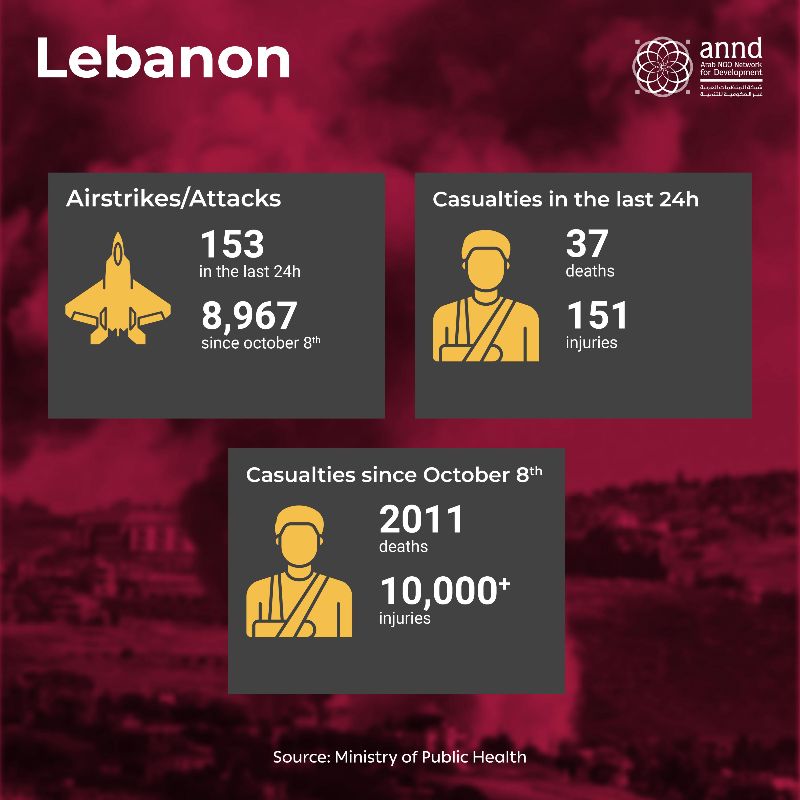
Lebanon: Political Developments
An Iranian delegation, including the Foreign Minister, members of parliament, and the head of the Iranian Red Crescent, arrived in Beirut and met with several Lebanese officials. After meeting with Parliament Speaker Nabih Berri, the Foreign Minister stated that Iran’s attack on Israel was self-defense and a response to attacks on Iranian interests. The Foreign Minister's statement carried multiple messages, signaling support for Lebanon and Hezbollah and linking a ceasefire in Lebanon with one in Gaza. This echoes the call from Iran’s Supreme Leader during Friday prayers mourning Hassan Nasrallah, urging continued resistance in Lebanon and Palestine. Regarding Iran's response to any Israeli retaliation, the leader emphasized a balance between not retreating and not rushing.
The statements from Khamenei in Tehran and the Iranian Foreign Minister in Beirut concurred with local efforts to activate a political initiative launched by the Lebanese Prime Minister, Parliament Speaker, and former minister Walid Jumblatt two days ago. The initiative calls for a ceasefire, implementing UN Resolution 1701, deploying the Lebanese army to the south, and electing a president with consensus. Several countries have intensified their plans to evacuate their nationals from Lebanon. Over the past few days, dozens of citizens from Greece, Cyprus, Bulgaria, Spain, Germany, Portugal, France, Turkey, the United Kingdom, and Canada have been evacuated by sea and military planes that landed at Beirut airport.
Humanitarian Response
A total of 931 centers have been opened to accommodate displaced people, including 707 centers in public schools, educational and vocational institutes, and universities designated by the Ministry of Education and Higher Education, along with agricultural institutes and public schools. A report by the Disaster Management Committee noted that 900 centers are already full, while the number of displaced people fleeing areas targeted by Israeli bombing continues to grow.
A total of 172,100 displaced persons have been registered in shelter centers listed by the National Operations Room. The Disaster Management Committee in the North Governorate reported an ongoing increase in displaced people across all northern districts, with 13,880 displaced persons arriving at officially designated centers by October 4.
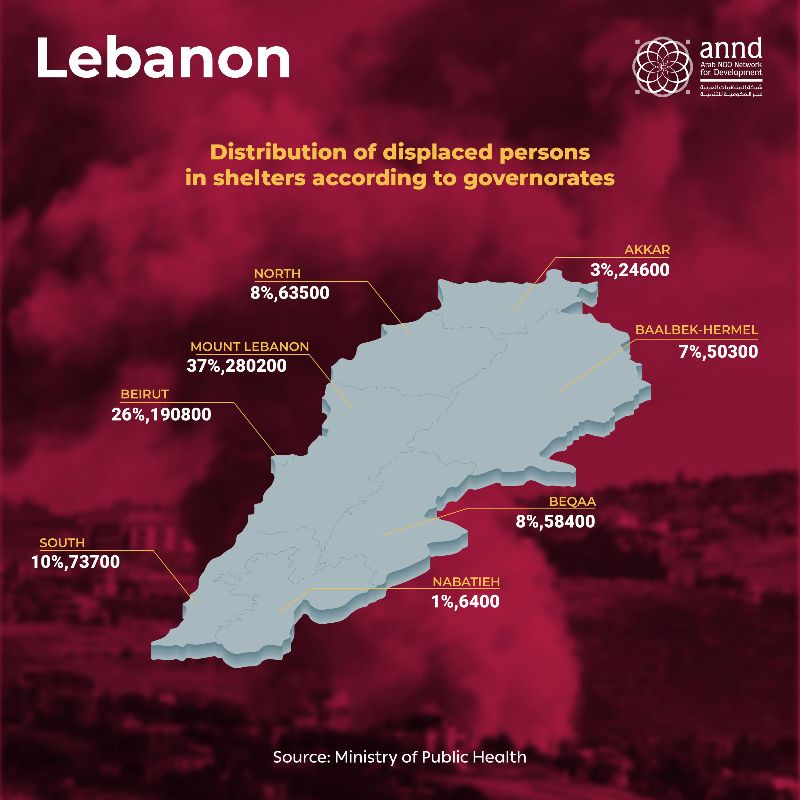
International relief organizations expressed concern after the bombing of the Lebanon-Syria border and blocking it, which affects the delivery of goods by land. Matthew Hollingworth, the World Food Programme's director for Lebanon, emphasized the urgent need to keep alternative routes, especially in northern Lebanon, open to ensure the continued movement of people and aid.
The start of the new academic year has sparked discussions among educational bodies, parents, and the Lebanese government about how to save the 2024-2025 academic year, given expectations that the crisis may prolong. Over 900 public schools are being used to shelter displaced people, while teachers, students, and administrators face extraordinary challenges. Among the ideas being considered is that private schools (especially Catholic ones) may start the school year and offer a second shift for students from the south, the Bekaa, and public schools. Private universities are also preparing to start the academic year virtually.
International Response
Several countries have responded to the joint humanitarian appeal launched by the United Nations and the Lebanese government, with several planes carrying humanitarian aid arriving at Beirut airport.
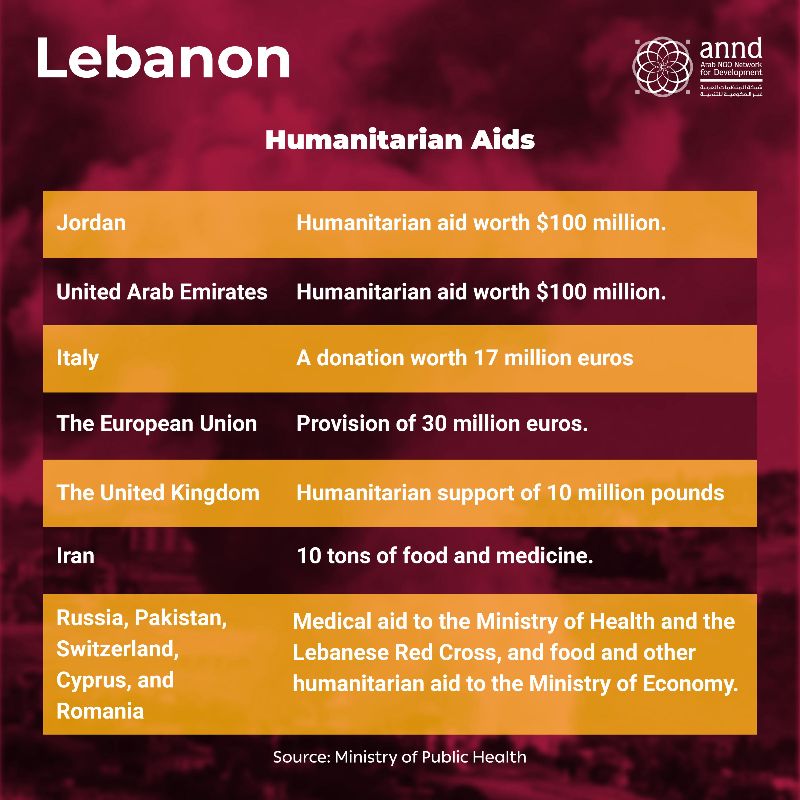
International Positions
The Israeli president demanded the removal of UN Secretary-General António Guterres, declaring him persona non grata. In contrast, Norway’s government announced its support for Guterres and rejected Israel's stance, while France’s foreign ministry expressed regret over Israel's unjustified actions and called for restraint toward the UN Secretary-General.
The G7 nations expressed their support for the efforts by the United States, Qatar, and Egypt to achieve a comprehensive political solution in line with the UN Security Council resolution. They repeated their call for an immediate ceasefire, the unconditional release of all hostages, and increased aid.
The International Committee of the Red Cross stated that the Middle East is on the brink of a regional armed conflict, with civilians most at risk.
Turkish President Recep Tayyip Erdoğan said Israel "is carrying out its aggression against Palestine and Lebanon, escalating matters and widening the conflict. Those who supply weapons to Israel are complicit in the aggression."
The United Nations has called for an independent investigation into the massacre that took place in Tulkarm, in the western West Bank, describing the airstrike as part of a disturbing pattern of Israel’s illegal use of force. The Secretary-General urged the international community to urgently come together to address the escalating cycle of violence and work toward ending the occupation and resuming the path to a two-state solution. The UN Office for the Coordination of Humanitarian Affairs (OCHA) is coordinating a visit to the region by UN agencies and NGOs to assess the damage and humanitarian needs and to support emergency response efforts.
The Iraq and Yemen Fronts
The Israeli army announced on Friday the deaths of two soldiers from the Golani Brigade in northern Israel. Israeli media reported that the attack was carried out by a drone launched from Iraq. Israel's army radio confirmed that the soldiers who were reported killed on Tuesday and Wednesday were the result of a drone explosion at a military base in northern Golan, launched from Iraq. Meanwhile, various factions carried out dozens of attacks against U.S. forces stationed in Iraq and Syria as part of the international coalition against ISIS.
Military operations have also expanded to Yemen, with the U.S. and the UK now engaged in the conflict. U.S. and British aircraft carried out a series of airstrikes targeting Hodeidah, Sana'a, and Dhamar provinces. One of the airstrikes targeted a maintenance camp in the al-Hasaba area, north of Sana'a. Israeli warplanes had previously carried out airstrikes on Hodeidah in western Yemen five days ago in the strongest raid since the start of the war, surpassing the intensity of a July airstrike. Some reports suggest that the airstrikes targeted Houthi leader Abdul Malik al-Houthi, who is believed to have moved to a safe location outside Sana'a.
Recent publications
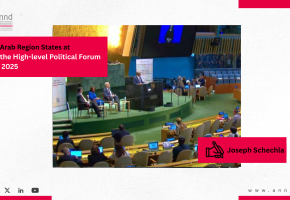
Arab Region States at the High-level Political Forum 2025 - Joseph Schechla
